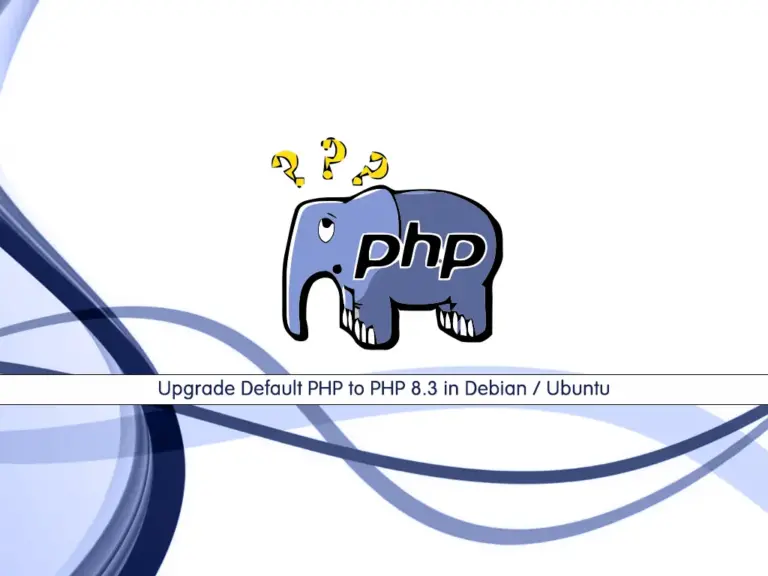Share your love
Upgrade Default PHP to PHP 8.3 in Debian / Ubuntu

This tutorial intends to teach you to Upgrade the Default PHP version to PHP 8.3 in Debian / Ubuntu from the terminal command line. In the last guide, we talked about the newly released PHP version which is PHP 8.3. It has many features and improvements. Also, it will be released on 23 November 2023. So we decided to provide a guide for upgrading the PHP version to the new version in Debian-based distros.
You can find more information about PHP 8.3 by visiting this guide on Upcoming PHP 8.3 and New Improvements.
Now follow the steps below to start your Upgrade process for PHP on Debian and Ubuntu.
Steps To Upgrade Default PHP to PHP 8.3 in Debian / Ubuntu
Before you start, you must have access to your server as a non-root user with sudo privileges. You can visit the Orcacore website and get the Debian-based distros’ initial setup guides.
You can use any version of Ubuntu and Debian server like Ubuntu 22.04, Debian 12, Debian 11, Ubuntu 20.04, etc. In this guide, to show you the guide steps we use Debian 12 server.
Step 1 – Check Default PHP Version in Debian / Ubuntu
The first step is to check your current PHP version. The default PHP version in Debian 12 is PHP 8.2. To verify it, you can run the command below:
php -vOutput
PHP 8.2.7 (cli) (built: Jun 9 2023 19:37:27) (NTS)
Copyright (c) The PHP Group
Zend Engine v4.2.7, Copyright (c) Zend Technologies
with Zend OPcache v8.2.7, Copyright (c), by Zend TechnologiesStep 2 – Remove Default PHP in Debian / Ubuntu
Before you start to upgrade your PHP version, you must remove your current PHP version installed on your Debian-based server. To do this, you can use the following syntax:
sudo apt purge php8.* -yWhen you are done, run the following commands to delete older versions of the packages that will never be required by you or the system:
# sudo apt autoclean
# sudo apt autoremoveStep 3 – Add PPA Repository To Get the Latest PHP Version
At this point, you must use the Ondřej Surý PPA repository to get PHP 8.3 in your Debian-based distros. First, install some required packages with the command below:
sudo apt -y install lsb-release apt-transport-https ca-certificatesThen, run the following wget command to add the PPA repository on Debian:
# sudo wget -O /etc/apt/trusted.gpg.d/php.gpg https://packages.sury.org/php/apt.gpg
# sudo echo "deb https://packages.sury.org/php/ $(lsb_release -sc) main" | sudo tee /etc/apt/sources.list.d/php.listOn Ubuntu servers, you can use the following command to add the PPA repository:
sudo add-apt-repository ppa:ondrej/php
When you are done, run the system update:
sudo apt updateStep 4 – Install PHP 8.3 in Debian / Ubuntu
At this point, you can get your PHP in the latest version which is PHP 8.3. To do this, you can run the command below:
sudo apt install php8.3 -yWhen your installation is completed, verify it by checking its version:
php -vOutput
PHP 8.3.0RC5 (cli) (built: Oct 26 2023 07:21:59) (NTS)
Copyright (c) The PHP Group
Zend Engine v4.3.0RC5, Copyright (c) Zend Technologies
with Zend OPcache v8.3.0RC5, Copyright (c), by Zend TechnologiesAs you can see, this is the RC version. Until 23 NOV it has been released, you can use it for testing. But the guide steps are the same.
Conclusion
At this point, you have learned to Upgrade the Default PHP version to PHP 8.3 in Debian / Ubuntu from the terminal command line. PHP 8.3 will be the latest stable release of PHP which will be released on 23 NOV. Hope you enjoy it.
Also, you may like these articles:
Find Apache and PHP Version Installed on Linux



